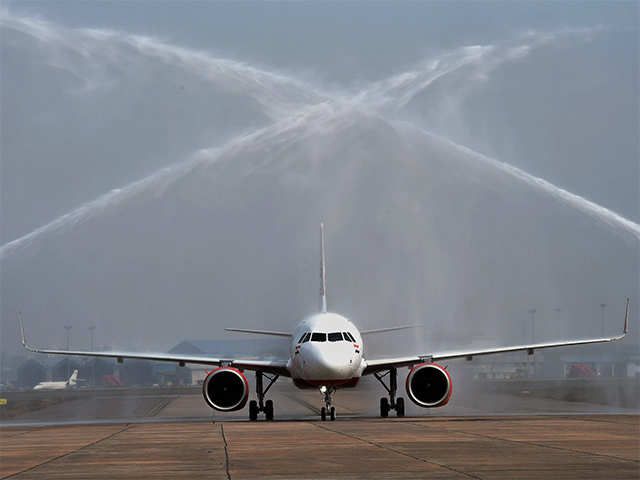The Senate Commerce Committee has narrowly voted against raising the mandatory airline pilot retirement age from 65 to 67. Reuters reported the committee spent Thursday going over a $107 billion proposed reauthorization bill for the agency and the retirement age was among the thorniest issues. The bill still has to go to the full Senate for approval before being reconciled with the House’s bill, which passed that chamber six months ago. The House approved the retirement age boost as a way to put more pilots at the disposal of airlines facing a labor shortage. However, there is also widespread opposition to the idea, including from FAA Administrator Mike Whitaker, who wrote a letter to Congress urging its rejection until more study could be done on the subject. The committee voted 14-13 against the measure.
Among the other positions taken by the committee was approval to extend the retained duration of cockpit voice recorder data to 25 hours and to increase the number of personnel in certification and enforcement. It also approved measures to boost air traffic controller hiring and add runway surveillance equipment at airports. The committee also approved a proposal to boost civil penalties for violations of airline consumer laws to $75,000 from $25,000.



































Like it or not, the decision about raising the retirement age for pt. 121 pilots from 65 to 67 revolves around Diversity, Equity, and Inclusion (DEI). The goal is/was to have a mix of pilots from greater range of age groups, combining the valuable experience of older pilots with chances for younger ones to help lessen pilot shortages. DEI principles focus on providing fair opportunities, and creating an inclusive environment that prioritizes competence and health rather than making assumptions based on age for ATPs.
You’re very delusional. DEI had nothing to do with raising the retirement age. Raising the retirement age will only put the public at risk. It’s a sneaky way to force people to continue working on to a later age.
If they truly wanted the experienced old guys to teach the young guys then they could have the retired return to the airlines and teach ground school or simulators from a classroom. There’s no age limit to be a CFI and you don’t need a first class medical to be a cfi. This has nothing to do with diverse age groups. Laughable.
I don’t agree that increasing the retirement age has nothing to do with DEI, however, I respect your view and understand your concerns about possible risks. The idea here is to make sure that senior pilots ages 65 through 67, now volunteering to extend, are skilled, mentally, and physically fit ATPs. We should be thankful that some are willing to stay longer to help with the pilot shortage and give the industry more time to bring in new talent.
I sure You are right, Mr. Raf Sierra
I don’t know. There are many people involved, so a few undoubtedly considered that extending the careers of a fairly homogeneous group of old pilots might slow opportunities for the more diverse pool of applicants, but at this point isn’t every capable applicant likely getting hired? Isn’t that the problem?
I think it’s more to do with good old fashioned CYA and risk avoidance. The FAA folks want more time to “study the issue” which they already should understand, but do not want any of the risk of. It doesn’t matter if it’s a good decision to extend those career options or not. There’s a risk that a 65 year old plus one week captain could be in the front of a plane crash which has downsides for many people at the FAA, on the Committee, and in management at the airlines. And, there’s no upside for most any of those people.
Delusional… nothing, but, pure unadulterated delusion. You can wave your DEI flag all day, every day. The colors of the strips don’t change. It is what it is.
Thank you for sharing your perspective, Tom. I appreciate hearing different viewpoints on the matter. It seems we might see things differently, and that’s perfectly okay. I’m open to understanding your concerns and finding common ground if possible. ☮️
You’re welcome Raf. Let’s be honest Raf. You don’t appreciate my viewpoint on this matter. Yes, we do see things differently and you are right, it’s perfectly ok. Again, let’s be honest with each other Raf. You don’t want to understand my position and like I said, that’s ok. But, please, don’t patronize me.
I understand. You are expressing a desire to be treated respectfully and not as if you are less knowledgeable or capable. This suggests to me a desire for genuine communication and mutual respect in the conversation. Got it!
Raf, I don’t agree that the 67 retirement age is motivated by DEI concerns, but I concur with your assessment of DEI in general. Raising the retirement age benefits the airlines, but actually inhibits to some degree the hiring of new young aviators. I also respect your interchange with Tom My, and see in his replies the fruits of hyperpolarization that has developed in this country. When civil discussion is claimed to be patronizing, civil discussion ends.
Understan WBJohn. Thanks.
DEI aside, it doesn’t make sense to pick an arbitrary age when pilots are forced to retire. Pilot experience is a huge safety asset for the airlines. Pilot health is an individual thing. Keeping more senior pilots does impedes younger pilots from occupying the captain slots but that’s an airline organizational thing, not a health, experience or safety thing.
I don’t know what data was used by the Senate Commerce Committee but they are not likely to be aviation experts. I agree that more study is needed but the airlines have been doing this for decades so there might be a danger of studying it to death.
Similar arguments / positions existed when the retirement age was increased from 60 to 65. Airliners were gonna fall out of the sky … but they didn’t. I have no data on how many ATP pilots this would impact in — say — the next 5 years but I can’t imagine it’s a large percentage especially when coupled with personal druthers? Why not conditionally try it and maybe require that an under 60 pilot be aboard and keep the retirement age at 65 with the option to go two more a personal decision with health thrown in? In other occupations, you don’t dare ask a person’s age yet here we are with the know-it-alls in Congress dictating again.
I always thought that letting the experienced captains stay on for a couple of extra years as mentors in the right seat flying with a younger PIC would be a great way to move the young workforce forward. Probably only a few percent would be willing to do that, but those few percent would probably make a significant contribution to the industry.
FAA data reveals a concerning decline in PRIVATE and COMMERCIAL pilot certifications from 2013 through 2022. PRIVATE pilot certifications are decreasing at a 9% annual rate, while COMMERCIAL pilots are declining at about 4% annually in comparison to 2013 numbers. On the other hand, ATP numbers have increased by approximately 5% annually, raising concerns about a potential bubble burst exacerbated by the 65-age limitation.
If the downward trend in PRIVATE pilot certifications are allowed to persists, it could lead to a shortage of COMMERCIAL and ATP pilots in the very near future. Taking proactive measures, such as raising the mandatory age requirement from 65 to 67, may help address this issue. This adjustment could provide more time for programs like the AOPA and EAA’s new-starts initiatives, to fill ranks and encourage new pilots to aspire to ATP roles.
Additionally, addressing the root causes of the decline in PRIVATE pilots, such as high training costs and limited access to flight schools, should be part of a comprehensive strategy to foster a healthy and sustainable aviation workforce.
ATP ranks need a boost keeping in mind that PRIVATE and COMMERCIAL PILOTS are potentially on their way IN to becoming ATPs where the present ATPs are potentially on their way OUT. I am for 67.
Think! Compared to the 1980 population census of 226 million, proportionally, there are 49.6% fewer pilots today. We require swift, forward-thinking solutions, incentives for pilot retention, investing in Pilot Training Programs-not silly-ass arguments. Ignoring the pilot population decline is not going to make it go away. ALPA is wrong!
Presumably the 65 to 67 decision arose from the FAA saying they needed to research the issues. One hopes that the research that will be done without the prejudices and bias that existed in previous research. Perhaps the first port of call should be a phone call to Australia, New Zealand Canada Brazil and Japan all of whom have respected aviation standards and have had no operational problems with removing age restrictions. There are other countries with increased age or no age limits not mentioned. Experience has shown this is not a safety or a medical issue. Existing simulator and medical checks have been found adequte in keeping pilots who shouldn’t be flying from doing so. And just for your information I was the oldest Part 121 B777 Check Captain in the world for a period at just short of 68 until Covid came along.
The vote itself had nothing to do with with pilot health, shortages, aeromedical issues, or further research. It was determined by Jason Ambrosi the ALPA president pandering to his now much younger base crowd of “get out of my seat Boomer” to maintain his power political power structure.
The FAA “position” paper, if it could be called that being issued the day prior to the meeting, was not even read by Whittaker prior to his signature being assigned to it. He had to have it read to him during the hearing.
My overriding thoughts while watching our clueless oafs and narcissistic reps bantering their drivel was I wish they could sit on my jumpseat while I explain to our new young airmen “if you pull that knob, even though it says HDG, we are going to descend to that lower altitude not assigned to us and that will be bad”.
Read the comments.
I don’t know the politics behind this but I could certainly see where ALPA and the Airlines themselves might see advantages to retiring older high cost pilots and allowing more room for advancement of lower cost, more flexible schedule younger pilots.
Does anyone know if these organizations actually opposed raising the age to 67?
ALPA strenuously opposed raising the retirement age. Doing so would have
1. Retarded advancement as senior pilots would not have retired as quickly.
2. Created a training backlog. Many of the senior pilots are flying internationally. Since the FAA would have have raised the retirement age above what ICAO allows, those pilots would have had to be retrained onto narrowbody jets and restricted to domestic flying.
3. Would not have adequately addressed the pilot shortage. How many pilots at this age are out on medical leave already?
Towards point three no data was presented that suggested pilots reaching retirement age are any more likely to medically dequal than any other age group.
Certainly, LTD information could easily have been collated by ALPA and used as support for their stance if it agreed with their position. This speculation suggests they looked at it and it did not give them support.
The issue which should be that any aeromedical qualification determined by age as the single data point is arbitrary, unjust, and discriminatory was ignored by ALPA leadership for the individual leaders immediate political gain. Happens all the time. This time to age 65 pilots.
The industry needs youth, starting in grade school. We know aviation does not require a FEDERAL STUDENT loanable $100-300k college degree.
A suggestion for Part 91, 135, and 121 certificate holders and Congress (a financial/national security issue?). The nation and industry should seriously consider rom providing grants/scholarships HS students (15-19) to supplement their A&P and flight training as follows:
– A 50% payment of cost of each hour of flight training/schooling the student incurs for private or A&P ($7000-10,000),
– A 50% or greater amount for Commercial Pilot ($17,000-$40000),
– Supplemented loan amount for hours required ($200/hr x 1000=$200,0000!) to meet ATP requirements with a certificate holder with 50-100% reimbursable if employed for 4-6 years.
OR
HAVE A TV SHOW ON AVIATION to replace the endless repetition of law enforcement, medical, Zombie programs :-).
Years ago, there was a program for High School students from some very poor area schools to come get free lessons. Pretty close to none showed up.
I suspect the transportation was never set up by the educators who didn’t want to be bothered. Some of the instructors were actually willing to go pick the kids up.
I bet if you offered free hours in fancy cars, the kids would show. I bet if you offered a free tour of a Gulfstream with a chance for selfies, the line would be long. Those under privileged kids don’t see “important” people or “rich” people being pilots anymore (yet GA airports still get attacked by classist activists anyways).
Raising the retirement age doesn’t solve the problem. Reduce the time requirements. It takes to long and costs too much money for someone to go from zero to 250 hrs let alone trying to get to 1200 or 1500. I got my private, commmercial, instrument and float rating in 270 hrs for under $10k.. That was 1979-1981. Price that out today when the average student can’t get it done in 400 hours with 70-80 hrs dual, one spoils $100k in metro areas. For that a prospective pilot gets the opportunity to work sporadically as a flying professional for 4 years trying to grab the brass ring. Join the Air Force and move on from there.
Here’s an important point to consider: The Age Discrimination in Employment Act (ADEA) in the U.S. prohibits discrimination against individuals who are 40 years of age or older in employment decisions. While Diversity, Equity, and Inclusion (DEI) programs aim to foster inclusivity and equal opportunities for all, concerns have arisen regarding potential age-related biases within these initiatives. Critics, including employees, advocates for fair employment practices, and individuals attentive to potential issues related to age discrimination within the workplace, argue that in industries emphasizing diversity, a focus on promoting younger individuals may inadvertently reject older employees.
Ref.: Employment Act (ADEA) in the U.S.:
Title: Age Discrimination in Employment Act (ADEA)
Jurisdiction: United States
Key Provision: Prohibits discrimination against individuals who are 40 years of age or older in employment decisions.
Enactment Year: 1967
Legal Citation: 29 U.S.C. § 621-634 (ADEA is codified in Title 29, Chapter 14 of the United States Code)
Purpose: Aims to protect individuals from age-based discrimination in the workplace and promotes employment opportunities based on ability rather than age.
Intended for the Senate Committee.
It’s important to note that the ADEA covers both private and public sector employers, including federal, state, and local governments. If individuals believe they have experienced age discrimination in federal employment, they have the right to file a complaint with the appropriate agency or pursue legal action in accordance with the ADEA.
Seriously? Does that Act ever get enforced? My mom ran HR for a financial institution, and there were never any cases that did not involve a woman (mostly black women). Anecdotal definitely, but wrong?
Of course, the FAA should have to regularly justify the age limit, but government loves to exempt itself from duties they oppose on the rest of us.
I am not opposed to the age increase at all. It should be part of the medical qualification procedure. IF that system is valid to being with – it should be valid for this too. You can’t get a medical – you’re out. Simple and easy just like my girlfriend.
I would disagree with Mr Sierra ( despite his stylish moniker) that DEI exists to create equal opportunities for all. DEI is a race and gender based system of hiring preference which makes it in direct contradiction to US Code. It is merely racism and genderism. It’s a step backwards because the US already had laws against discrimination in hiring due to race or gender.
That said, I have no problem with pilots of any race whether female or male. You get the qualifications, you’re okay in my book. But I really believed in Dr. Kings dream and I hate to see it either put off further ( if you’re optimistic) or killed outright ( if you’re not) by prioritizing a person’s skin or sex.
Another thing about DEI is it’s puts the onus on those groups. If females are less interested in being pilots that ought to be acceptable to us as a society. One of the silliest things about DEI is the idea that if 50% of the people are female, 50% of the pilots ought to be female. If females don’t care about flying as much as males that should be all right. When DEI starts caring about getting more males into nursing, more women into garbage collection and more Caucasians in the NBA, then maybe I could begin to look at it seriously. Right now it fails to address any problems, reinforces race and gender discrimination and demeans us all as humans.
“Bill” said: “But I really believed in Dr. Kings dream and I hate to see it either put off further ( if you’re optimistic) or killed outright ( if you’re not) by prioritizing a person’s skin or sex.”
My optimism shrinks with every race conflict event. I sometimes wonder what America would be like today if MLK had had a full life.